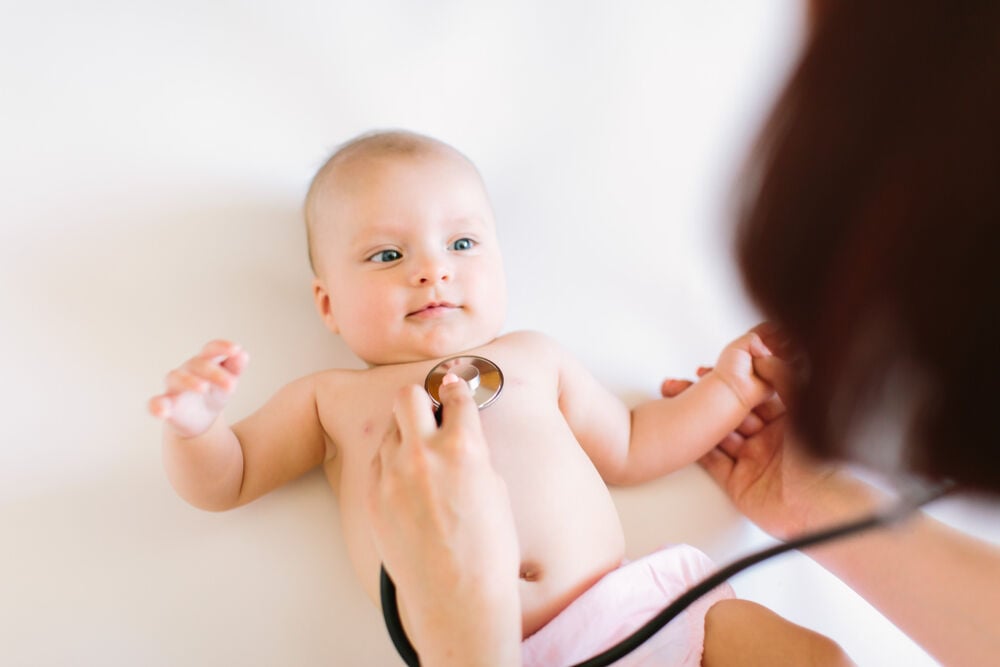Newborns' breathing patterns are often irregular and can make parents worry. Babies might breathe fast, make strange noises, and take pauses between breaths. Generally, there's nothing worry about regarding your baby's breathing pattern. Paying attention to their breathing, though, can help you determine what normal is and differentiate if something abnormal develops later on.
-
Tracking cycle
-
Getting pregnant
-
Pregnancy
-
Help Center
-
Flo for Partners
-
Anonymous Mode
-
Flo app reviews
-
Flo Premium New
-
Secret Chats New
-
Symptom Checker New
-
Your cycle
-
Health 360°
-
Getting pregnant
-
Pregnancy
-
Being a mom
-
LGBTQ+
-
Quizzes
-
Ovulation calculator
-
hCG calculator
-
Pregnancy test calculator
-
Menstrual cycle calculator
-
Period calculator
-
Implantation calculator
-
Pregnancy weeks to months calculator
-
Pregnancy due date calculator
-
IVF and FET due date calculator
-
Due date calculator by ultrasound
-
Medical Affairs
-
Science & Research
-
Pass It On Project New
-
Privacy Portal
-
Press Center
-
Flo Accuracy
-
Careers
-
Contact Us
Babies' Breathing: What Baby's Wheezing, Grunting, and Snoring Tells You


Every piece of content at Flo Health adheres to the highest editorial standards for language, style, and medical accuracy. To learn what we do to deliver the best health and lifestyle insights to you, check out our content review principles.
What babies' breathing can tell about their health
Newborns’ breathing sounds and looks different from adult breathing because:
- Babies breathe more through their nose.
- Their airways are smaller and may easily get obstructed.
- Babies' chest walls are more flexible than adults' (they're mostly made of cartilage).
- Babies' respiration function isn't fully developed. They are still learning how to use their lungs and associated muscles.
- Meconium and amniotic fluid may still be present in their respiratory tract immediately after birth.
Infants take about 30 to 60 breaths per minute on average. Newborns' breathing may slow down to 20 breaths per minute when they sleep. When your baby is 6 months old, they take about 26 to 40 breaths per minute.
Newborns may also breathe rapidly and then stop breathing for up to 8 to 10 seconds. Most newborn breathing irregularities resolve by themselves within a few months.
Pay close attention to and become familiar with your baby's normal breathing patterns and sounds. If there's an abnormal breathing sound, it may indicate a potential health problem. According to estimates, about 16 to 29 percent of neonatal intensive care admissions occur because of respiratory distress.
Baby is wheezing: why does that happen?
The bronchioles are small airways that branch out from the bronchi, the main passage into the lungs. When the bronchioles become blocked, it can produce a whistling or wheezing sound when your baby exhales.
Some of the potential causes of wheezing are allergies, bronchiolitis, and asthma. Your baby might form extra phlegm because of allergies (maybe after trying a new food or being exposed to air pollution). Since they can't yet clear their throat or blow their nose, the phlegm stays in their small nasal passages.
Bronchiolitis is an infection of the lower respiratory tract. It commonly occurs during the winter months. Bronchiolitis causes congestion and inflammation of the lungs, making babies cough and wheeze.
In some cases, a baby wheezing may indicate asthma, especially if the wheezing is persistent, there is a family history of asthma, or the parents smoke. In certain rare cases, wheezing may indicate a congenital disease such as cystic fibrosis or other illnesses such as whooping cough or pneumonia.
Flo is great to track my period. It is pretty accurate and alerts me when my period is late. I like the advice it gives me when I track headaches and moods. I have recently started trying for a baby so its great to show me when I'm ovulating. Recommend!
Baby is grunting: is it normal?
Newborn grunting sounds are generally related to their digestion. Your child is getting familiar with formula or breast milk. They may have gas in their belly, causing discomfort. A newborn grunting usually means they are moving gas and stool through their digestive system.
Due to their weak abdominal muscles, they apply downward pressure using their diaphragm, which pushes against the baby's closed glottis (voice box) and results in a grunting noise. Your baby's face may become red or purple in the process — this is completely normal.
However, a baby grunting with every breath isn't normal and may indicate respiratory distress. A baby grunting with every breath may indicate serious conditions including:
- Asthma
- Sepsis
- Pneumonia
- Heart failure
- Meningitis
You can check for other signs and symptoms of respiratory illness or distress to find out if the grunting is abnormal. Some of those signs and symptoms include:
- Blue skin or tongue
- Fever
- Weight loss
- Lethargy
- Pauses during breathing
- Nasal flaring
Take a quiz
Find out what you can do with our Health Assistant
Is grunting in sleep healthy for babies?
Sometimes your baby may grunt in their sleep. This is completely normal, as your baby's respiratory system is still maturing. Newborns' breathing rate gets slower during sleep, and this can cause them to grunt, with shallow breaths.
Snoring in babies
Newborn infants often make noises when they breathe, particularly during sleep. If your baby is snoring, in most cases, these breathing noises aren't a cause for concern. Because of your baby's small nasal passages, any extra mucus or dryness in their nose can cause snoring.
Some other possible causes of newborn snoring are a stuffy nose, deviated nasal septum, and even sleep apnea. Snoring may also indicate laryngomalacia. In this condition, the laryngeal tissues become soft, making the larynx floppy and malformed and causing it to fall over and partially block the airways.
Baby is breathing fast: is it a problem?
If your baby's breathing is fast and labored, there may be fluid in the alveoli (the smallest part of the lungs). Fluid can accumulate in the alveoli due to pneumonia, which is an infection of the lungs that results from bacteria or a virus.
Pneumonia can cause labored, fast breathing, a persistent cough, crackly sounds in the chest (when the doctor listens using a stethoscope). Fast breathing in babies may also occur due to fever or other types of infections. If your baby's breathing is fast and labored, take them to the doctor immediately.
Reasons to call a doctor

Early diagnosis gives your child the best chance of recovery and can help reduce the occurrence of future problems. Any change in the pattern of your newborn's breathing may indicate a respiratory problem. If you have any concerns about your baby's breathing, call a doctor immediately. Doctors can perform a chest X-ray to diagnose any breathing issues and provide a treatment plan accordingly.
If your baby develops any of the following symptoms, you should call 911:
- Their breathing stops for 20 seconds or longer.
- Their lips, fingernails, toenails, or tongue turn blue (cyanosis).
Visit your doctor immediately in any of the following circumstances:
- Your baby is moaning or grunting with every breath.
- Your baby's nostrils are flaring, as they are making more effort to take oxygen into their lungs.
- The muscles around your baby's collarbones, on their neck, or under their ribs are pulling in and out more deeply than normal.
- Your baby is having difficulty eating along with breathing problems.
- Your baby has a fever along with breathing issues.
- Your baby is lethargic, and their energy levels are decreased.
Newborn breathing patterns are often irregular and can make parents worry. Babies often make distinctive noises while breathing, breathe quickly, and take occasional pauses between breaths. Though these newborn breathing patterns are normal, you should pay close attention to them.
There are some abnormal newborn breathing sounds that can indicate a potential health issue. Some of these are wheezing, grunting, snoring, and fast and labored breathing. If your baby develops symptoms of fever, lethargy, difficulty eating, grunting, flaring of nostrils, or cyanosis along with breathing issues, call a doctor immediately.


Hey, I'm Anique
I started using Flo app to track my period and ovulation because we wanted to have a baby.


The Flo app helped me learn about my body and spot ovulation signs during our conception journey.


I vividly
remember the day
that we switched
Flo into
Pregnancy Mode — it was
such a special
moment.
Real stories, real results
Learn how the Flo app became an amazing cheerleader for us on our conception journey.




